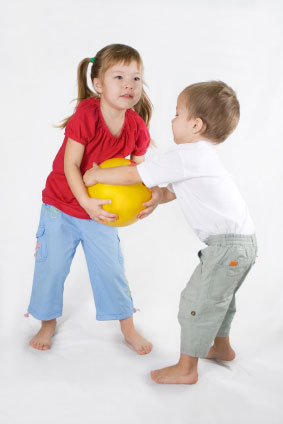Kids Playing Nice? How to Handle Conflict on the Playground

As parents, caregivers and teachers, it is important to realize the importance of the playground as a place for children to learn how to interact with friends in a non-structured environment. Children need opportunities to discover what is appropriate behavior and what is inappropriate behavior when engaging with friends. When children are given these opportunities, they learn how to solve their own conflicts and disagreements without relying on adult support.
Pros and Cons of Allowing Children to Resolve Their Own Conflicts:
Pros:
-
Gives children an opportunity to express their thoughts, feelings and ideas about the situation.When adults intervene in children’s conflicts, they often hold the power and make the decisions for the children based on what they saw or heard, leaving the children to feel powerless and uninvolved.
-
Allows the children to be a part of the solution to the problem and also think about what is fair for both parties. Children may not always understand why or how a solution was made. As adults, we sometimes tend to tell children what is right and wrong without allowing them to feel the effects of their own actions.
-
Provides children with a chance to use and explore language and improve their conversation skills. When children talk it out, they are using and learning new language while also taking turns during conversation.
Cons:
-
May result in physical altercations. Some children may not have the language to express how they are feeling and may react physically to a conflict or situation. Of course, this is something that everyone wants to avoid.
-
Compromise can be difficult for children. Children are egocentric and do not always understand how someone else feels and why something may be unfair.
Here are some tips to consider in deciding when to intervene or when to let children work things out on their own:
- Before sending them off into the playground, remind children of the words and phrases that they can use when talking to friends. Children need to practice using these phrases to be able to use them independently.
-
When your child approaches to complain, “my friend hit me” or “my friend took a toy,” ask your child if he or she wanted that person to do that. Then explain why it is important to tell friends what they are feeling.
-
Send them back to the friend to say something like, “I did not like it when you hit me” or “I am stilling playing with that toy.” By doing so, you are not only giving your child the language they need to solve their problem, but also the confidence and reassurance that they can speak up for themselves.
-
Although we are encouraging children’s independence, it is still important to observe your children on the playground and listen for the words they are using and the types of interactions they are having with others. On your walk home, you can say, “I noticed that when Sasha pushed you, you used your words to tell her that you did not like that. She knows that it is not okay to do that you. Great job!” Acknowledging positive interactions will encourage and motivate your child to repeat them.
-
If it seems that your child is getting too close to being physical or to getting too upset, then by all means, intervene. However, it is important to make sure that children talk out the problem with your assistance.
Children will need opportunities to practice these social skills on their own. They are still learning about the world and how to manage themselves in social environments like the playground and school. Always remember to support, but try not to take over.
Have fun this summer!
SHARED By: Jessica Volkers, Teacher at Early Learning Foundations Preschool
Through her work as an early childhood educator, Jessica encourages children to explore their world and become intrinsic, self-motivated learners. She holds a B.S. in Early Childhood Education from SUNY New Paltzand a master’s degree in Literacy Education form Hunter College CUNY. Jessica also enjoys taking pictures, baking and decorating cakes. She has a cat named Snowball and a dog named Ryu.









